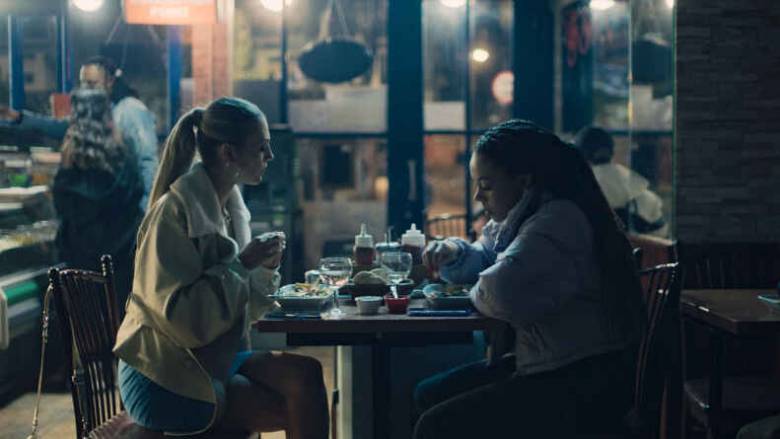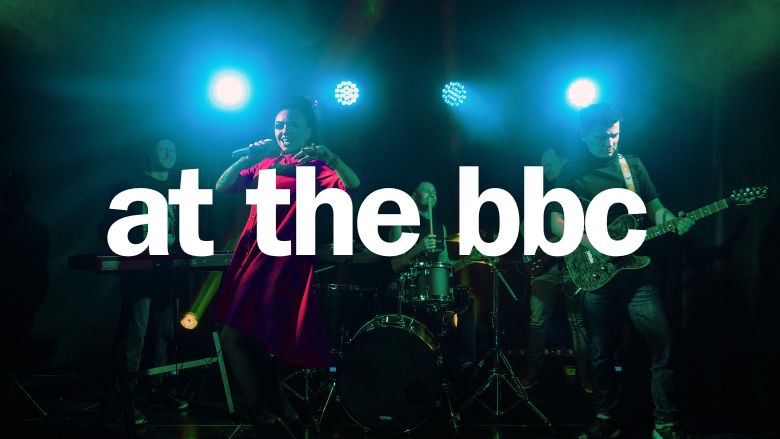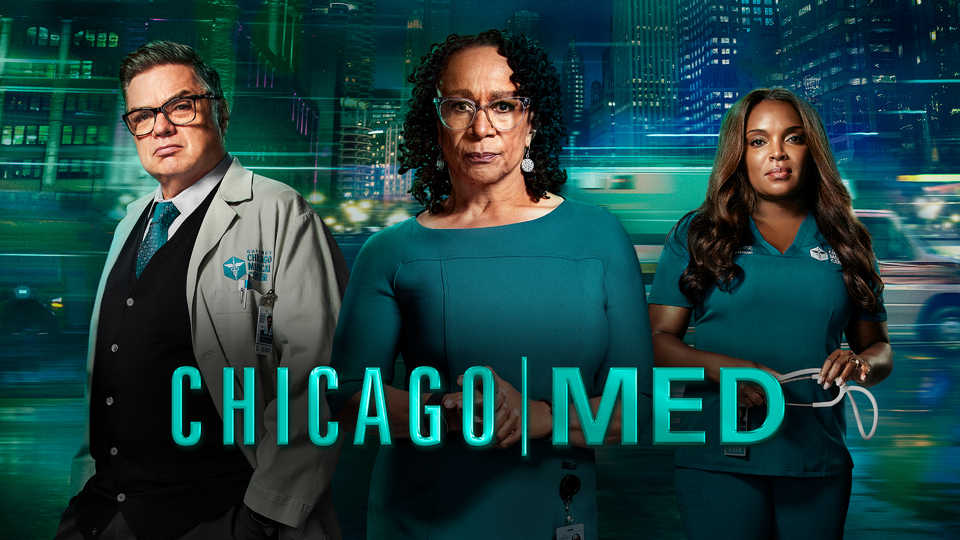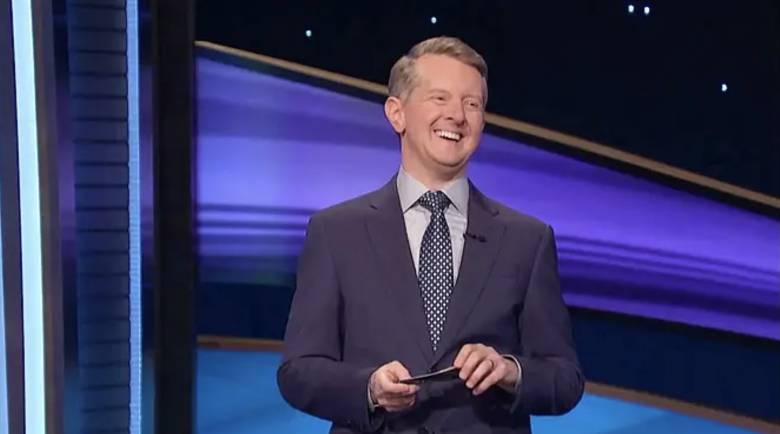What is Mood about?
Mood is about Sasha, a young woman in her mid-20’s who is really stuck in her life. She’s still sitting in her bedroom getting stoned and supposedly finishing off her first EP. Her family are really frustrated, and she gets caught setting fire to her ex-boyfriend’s house as he’s been ghosting her for weeks. She had told him something and this has kind of kicked off a catastrophe in Sasha’s life. Sasha argues with her family and she gets kicked out of home and becomes homeless. We realise she’s kind of given up on a lot of her friends and in her relationships and ends up on her drug dealer’s sofa, Saleem, who’s quite a threatening character.
She then meets this young woman Carly Visions, an influencer who also does a lot of online modelling work. She takes Sasha under her wing, gives her a place to live and Sasha helps her with her work in exchange, Sasha then finds out Carly actually does online sex work and while at first she doesn’t want to get involved herself she soon gets in deeper into that world and the world of escorting. The heart of the story is about Sasha finding her voice, finding herself and learning to love herself because she is actually running away from something, something that happened to her when she was young and something that she’s not faced up to and we as an audience follow the story. We realise trauma is bubbling up in Sasha and there’s something that she keeps trying to escape from, but eventually she has to face up to that trauma and what really happened to her. At the end of the series Sasha has all these songs she’s written through the experiences she’s been through, and we’re left with the question of what she’s going to do with them. It feels like a really universal story, someone who’s lost their way and the only way to find it, is to come back to yourself and have confidence in yourself again.
What made you think a play could work as a TV series?
Mood is based on the play that Nicôle wrote called ‘Superhoe’ and Nicôle’s agent sent it to me as a script and as I started reading, the Sasha character just bounced off the page. She was such a vivid character; she was annoying and loud and very funny and very observational and acute. The script was very witty, and I felt that it was such a vibrant voice and it really spoke to me. It was just an extraordinary, brilliant rollercoaster of a read as well. Every moment in the script, in the play really took you on a massive journey and I remember feeling pretty gobsmacked by the ending as well, I hadn’t seen that coming. I went to see Nicôle perform the play and, not only was she brilliant playing every character, which was amazing, but she started singing and that was extraordinary because I was seeing this actress with an amazing voice.
Why is this an important story to tell? Why is it relevant today?
Mood explores a lot of issues that affects young people today, like trying to make ends meet, how can you actually survive in this world and the particular issue of feeling like how will you make it.
There’s social media and the representation of success for young people is ever present that you should be able to make it and have a perfect life and look amazing. There’s a gap between the reality of daily struggles and not knowing who or what you should be in life and the dream of perfection that we’re presented with online, that is a really big issue that the story explores.
How important is music as part of telling the story?
The music in Mood is just so integral to the narrative. The songs, the musical sequences in Mood, come in and tell us part of the story, about how Sasha’s feeling. The songs get inside her head and let us as an audience in. They’re fantasies actually, they’re Sasha’s way of her coming out the situation she’s in and into her head, and processing what is happening to her, so the songs an integral part of the storytelling in the show.
What is it like to work with Nicôle?
I tease Nicôle about one of the early press announcements in Variety for the show that first said “the multi-hyphenated Nicôle Lecky” as she also likes to trampoline while watching TV or doing emails! But that’s exactly what Nicôle is. I mean, she really is great at all these things, writing, creating music, acting, originating the whole vision. It’s been an extraordinary experience working with Nicôle I feel really lucky I’m on this first journey with her. She’s writing every word, she’s acting, she’s collaborating with musicians and leading all these teams that come together on a show.
How do you make sure you balance the complex subjects and entertainment aspect, to make sure people enjoy it but also make sure real experiences are represented?
The show does touch on a lot of really sensitive issues and one of the things we did from the get-go, which was very important to Nicôle, was to have authenticity. So it started with really good research. It was all about meeting people who’d had these experiences and ensuring that we got really good insight, rather than just going off ourselves. We met a lot of young women who were sex workers across the board, in different ways. I think you need to find the balance between doing your research and really taking people’s experiences and finding truth in authentic experiences to base your stories on. It’s treating those stories with humanity, we are all imperfect, we are funny, even when things are dark – I think it’s about finding that human lightness and a touch of humour in a way of accessing those senses, those sensitive issues. If you’re true to those issues and those experiences, then you can have humour as well because that’s often how we all process things.
Why did you approach Dawn as director for the project? What was it about her background/career that you thought was important to bring to Mood?
Mood is unique in the way it uses music sequences as the heart of the narrative, so we always knew we wanted a director who could be truly original and visually exciting with music while really understanding how music videos worked. We had Dawn in mind from the very beginning because of her amazing career in music videos as well as drama – and the fact that she was a strong female director of course. Dawn brought on the amazingly talented DOP Molly Manning Walker, who also had shot a lot of music videos. Together they developed a visual style that really told the story from Sasha’s perspective, hand-held and really close up and personal with Sasha that allowed the authenticity and messiness of Sasha and her journey come to life. While, on the other hand, the music sequences were much more heightened fantasy-based and in Sasha’s head – full of movement, colour and life.
Nicôle and Dawn and Molly all worked closely with choreographers to create these sequences with dancers and SAs who were sourced from the areas we were shooting, who all take us into these imaginative, stylised spaces. And in the second half of the series, brilliantly directed by newcomer Stroma Cairns, is in some ways even more ambitious. Certainly the music sequences kept getting bigger as they developed in prep! Production designer Sarah Jenneson built an entire TV studio set for Charge It in episode four, on which Stroma and DOP Nick Morris got to shoot a music video in all day together with Nicôle and Renee (playing Paris) performing an amazing number with dancers, crowd – and a special cameo!
How will Mood resonate with an international audience?
Mood will resonate with an international audience because the issues are so universal, being young and trying to find your way and also the awareness that we all have been impacted by social media. So much of what is represented is people’s most successful, aspirational, perfect lives all the time that’s often in contrast with where we’re at ourselves. I think that sort of gap and the desire to have it all is being brought out even more to the forefront by social media and that’s something that this show really explores and it will resonate with audiences globally.
Why should people watch Mood?
People will come to Mood because it’s got so much going on in it. Sasha’s story is a huge rollercoaster. I think that will bring audiences to it because you don’t know what’s going happen next and I think you end most episodes going “oh Sasha, don’t do that” or “oh, you’re gonna do this now”, and I think that’s always really hooky and appealing. It’s such a human story. The other thing is the music, it’s got so much life to it, it’s so vibrant. We see a side of London that a lot of people haven’t seen, and the music just brings so much to life. It’s got such glorious moments because of that.
Is the location a part of the show’s story?
The series is really about London. We really wanted to make sure that we could really show a side of London that we don’t normally see. It’s not just about that skyline and the River Thames or Buckingham Palace. It’s very much rooted in East London where Sasha the character grows up and we loved finding amazing locations that just felt authentic and urban, to characters like Sasha, as opposed to just the tourist attractions.













